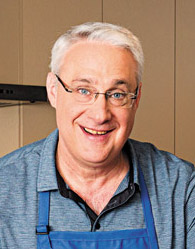A Recipe For Wellness

HMSA president and CEO Michael Stollar
Whether he’s leading Hawai‘i’s largest health care insurer or whipping up an appetizing dish at home, HMSA president and CEO Michael Stollar seems to have what all great head chefs possess: the magic touch.
Michael Stollar is a whiz in the kitchen as a home cook. He knows that getting good results takes having the best ingredients that blend well. The same formula applies to his role as the state’s leading health care insurer.
We asked Stollar, president-CEO of Hawai‘i Medical Service Association (HMSA), to serve up his recipe for success. He dishes it out in a candid and forthright manner. With the vested interest our community has in quality health care, there is hunger for his perspective and projections. Take a seat at the table and digest his insights.
“Churn, lots of churn, and lots of uncertainty” is the way Stollar describes today’s health insurance picture in a recent news report.
All of the things the Affordable Care Act (ACA) aimed to stabilize in the market are being threatened, bringing huge rate increases, according to Stollar. That — and the simultaneous churn of health care reform by providers — makes for a banquet of revolutionary change.

Stollar knows it takes a steady hand on the operations of his organization, plus the vision to secure its place in a community, to survive the maelstrom.
With nearly 2,000 employees and more than 736,000 members in the mix, including the state’s major employers, there is much at stake as HMSA buffers a highly regulated environment and ever-mounting mandates that add spice to the business.
TROPICAL TRANSFORMATION
But Stollar has the ingredients — vast experience, hard-working employees and supportive stakeholders — to make the process palatable. His plan even has a name: Mahie 2020.

“It’s all about transformation,” explains the 59-year-old executive. “It’s the catalyst to sustain a system that advances the health and well-being of our community. Keeping people healthy is huge. It determines where we put our resources and where we can have impact.
“We want to create simpler, value-driven benefits to empower health outcomes. That calls for integrated plans with our stakeholders and engaging consumers. We must address upstream (big picture) issues that determine health and well-being,” he explains.
Stollar has served HMSA for more than 30 years, playing key leadership roles throughout the company. He has been chief executive officer and treasurer of the health insurer since January 2018 and president since January 2017.
With the top post came years of experience serving in different roles, including underwriting, information technology, corporate planning, product development, dental management, e-business and health services, as well as marketing and communications.
“I started in underwriting,” he reminisces. Moving to Hawai‘i from the South Pacific after a stint in the Peace Corps, the East Coast native found himself jobless in Honolulu.
“Someone told me to try HMSA, and I went for an interview, only to be told to return the next day to see a guy named Mike Gold,” he recalls.
Gold seemed less interested at the time in Stollar’s job qualifications than his towering 6-foot-2 frame and athletic abilities.
“Can you play basketball for us next week?” Gold asked.
Stollar’s reply was, “Yes, if you’ll hire me.”
The rest is history. Stollar played in a medical services league championship tournament and was hired by HMSA’s underwriting department under Gold’s mentorship. Gold is known for his illustrious 43-year career with HMSA, including being president from 2012 to 2017.
A DROP IN THE BUCKET
Fast-forward three decades later, and the kid that Gold hired to play basketball succeeds him as president-CEO of the state’s largest health plan company. Score one for destiny.
Describing his role today, Stollar cites internal and external parameters.
“Internal involves team-building, enabling people to do their jobs to the fullest, coaching, culture-building, setting expectations, and providing the right tools and environment,” he says.
“External focuses on building relationships with customers, partners, physicians, hospital systems and the community,” he adds.
“Leading HMSA is an honor and privilege that comes with profound responsibilities,” Stollar says. “My job is to ensure that we work with every stakeholder to build a community system of health that is safe, affordable, accessible, and delivers the kinds of health and well-being outcomes that Hawai‘i’s people deserve.”
That desire dates back to 1938, when HMSA was a community health plan started by social workers and teachers. Today, HMSA covers more than half of Hawai‘i’s population. It is an independent licensee of the Blue Cross and Blue Shield Association.
While there have been many milestones along the way, more recently one can point to Gold and Stollar’s progressive achievement of payment transformation. They worked with doctors and national health care leaders to transform insurance payments, reimbursing doctors for improving patients’ overall physical, mental and emotional health. More than 90 percent of eligible primary care doctors have joined the payment transformation, and HMSA is now working with specialists and hospitals to further develop forms of payment aligned with desired outcomes.
“Cost of care is really what drives insurance rates,” Stollar reflects. “We’re a nonprofit when it comes to health plan delivery. HMSA expends over $3 billion based on money we pay out to ensure that people get coverage. Latest technology, new drugs and the forces of big pharma (pharmaceutical marketing and advertising) contribute to the cost factors.
“Providers have an important role,” he acknowledges. “It’s the difference between sick care and health care. We spend tremendous amounts of money as a society and community on sick care. It’s difficult, expensive and trying. At some point, it becomes unsustainable. Something’s going to give.”
COMMUNITY CARE
“With the aging population, cost of new technology and new drug treatments, it’s just a continual challenge,” he offers. “Catastrophic (diabetes, hypertension, heart) diseases also add a strain. Making healthy choices through lifestyle is the easy choice.”
Admittedly, Stollar realizes, most people don’t think about health insurance until they need it. So there’s an aloof regard for the whole subject, except when rates go up.
If that’s not enough to keep Stollar up at night, there are government mandates and political infighting over health care legislation.
“Health reform is a struggle in large part because there’s so much uncertainty,” he states. “Rates are raised to cover uncertainty (risk). With the current administration, there’s uncertainty.
“Ultimately, by keeping the population healthy, there’s less strain on the system,” Stollar asserts. “Luckily, in urban Honolulu, there is a fast-evolving delivery of care with innovations such as telemedicine, robotics, mental and behavioral health advances.”
HMSA’s community focus includes the development of what it calls Blue Zones, where regional health needs and projects are addressed with neighborhood participants. Programs are designed specifically for geographic areas to target local issues. It’s an expanding concept that also includes allied programs such as Care Model, where HMSA works with nurses, pharmacists, social workers and community health agencies to support the sickest patients requiring special needs and counseling as a wellness safety net of services.
“Our analytics can identify members who need help. There are a small percentage of our members who cost the most,” Stollar says. “Gaps become opportunities. We can help with a human touch, help address costs, and provide coaching to keep people from going back into the hospital.”
Sounds like Stollar’s got the secret sauce to the entree when it comes to winwin situations in health care.
Best we keep enlightened executives like Stollar in the kitchen where he can cook up answers. His mother, Carol, a clinical nutritionist, and dad, David, an immunologist, would say he’s on the right burner to finding practical solutions. Add to the family support wife Cynthia and their three daughters, and it’s certain that Stollar will be in the kitchen of life and health care for some time.
Anyone care for another dish of destiny?

Mike’s Island Barbecue Chicken
Serves 6-8
Ingredients
• 4-1/2 pounds bone-in, skin-on chicken thighs (about 12 thighs, or other parts)
• 2 tablespoons Hawaiian salt
• 1/4 cup soy sauce
• 1/4 cup freshly squeezed lemon juice
• 1/4 cup vegetable oil
• 1 tablespoon sugar
• 1 large clove garlic, crushed
Instructions
Cut off excess fat from chicken thighs. Rub chicken with Hawaiian salt. Add in soy sauce, lemon juice, oil, sugar and garlic. Marinate in refrigerator overnight, or for at least 30 minutes. Barbecue until cooked or bake in oven at 350 degrees until chicken is cooked, about 1 hour. Broil for 1-2 minutes if you prefer skin to be more browned. Enjoy hot or at room temperature.






